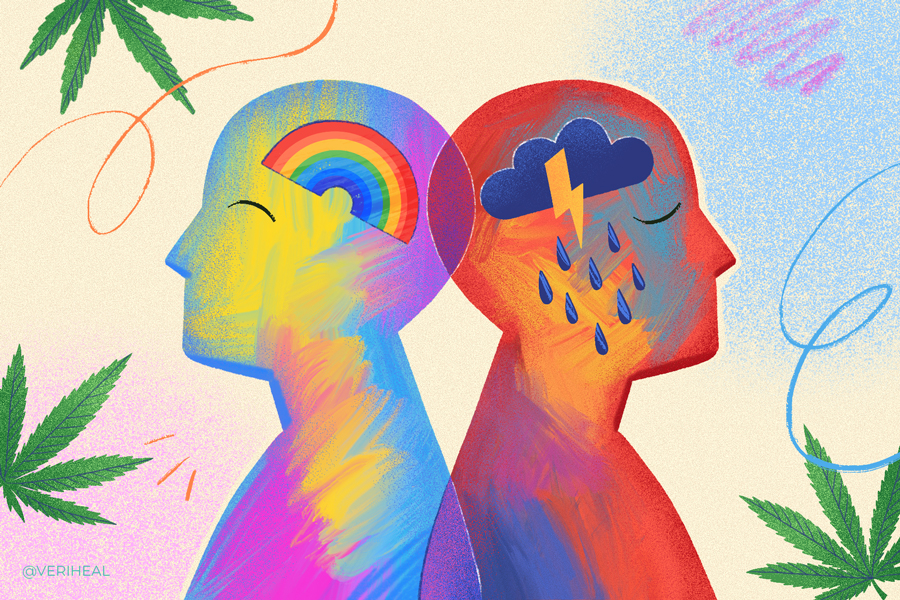Bipolar disorder is a complex condition that impacts millions worldwide, leading to extreme mood swings, intense emotional episodes, and difficulty managing day-to-day life. But there may be some good news for those coping with this mental health issue.
According to recent research, cannabis could offer unique benefits as part of an approach to managing bipolar disorder. In this article, we’ll explore how the potential advantages of cannabis might help stabilize symptoms associated with bipolar disorder.
Bipolar Disorder Facts You Should Know
Statistics estimate that approximately 46 million people across the world live with bipolar disorder. Also called manic depression, bipolar disorder can affect relationships and work performance.
According to the National Institute of Mental Health, there are three types of bipolar disorder:
- Bipolar I: characterized by episodes of manic behavior lasting at least a week and even requiring hospitalization
- Bipolar II: characterized by alternating bouts of manic depression and depressive episodes, with increased agitation and energy
- Cyclothymic disorder: characterized by mood swings ranging from excessive energy to depression in an instant
Treatment for bipolar disorder typically involves psychotherapy and medication. Most commonly, pharmaceutical medication is prescribed to regulate moods. However, pharmaceutical medications can have side effects, and they may take longer to work for many patients.
Bipolar Disorder May Be Treatable With Cannabis, According to a New Study
New research shows that cannabis exhibits “uniquely beneficial effects” on cognitive performance and goal-directed behavior in bipolar patients. A team of researchers, who presented their study results during the Neuroscience 2022 conference, demonstrated that cannabis improves mental performance while reducing risky decision-making, a symptom commonly associated with bipolar disorder.
By reducing dopaminergic transmissions in the brain, cannabis may help suppress bipolar symptoms. Preliminary findings indicate that normalizing dopamine release can lead to improvements in goal-directed behaviors, suggesting beneficial effects on people suffering from BD. Further exploration of this possibility is underway to provide better care and more effective therapies for individuals living with the condition.
Using Cannabis for Bipolar Disorder Symptoms Is Also Supported by Early Research
Earlier groundbreaking research has also suggested cannabis consumption may be associated with improved bipolar disorder symptoms for patients. A 2016 experiment conducted by scientists from Harvard Medical School, Tufts University, and McLean Hospital explored the impact of marijuana on both mood and cognitive function in those diagnosed with this mental health condition, making it the first such study ever undertaken in this area. Initial findings showed no adverse effects on cognition due to cannabis use, further validating promising conclusions noted in previous studies regarding its potential beneficial properties when managing these disorders.
Why You Should Get Your Medical Marijuana Card
Veriheal has satisfied millions of patients nationwide by giving them access to these benefits
- Larger purchase limits
- Peace of mind
- Enhanced legal protection
- Access to higher potency strains
- Save up to 25% on cannabis purchases
- Skip the line at the dispensary
Additionally, researchers discovered the plant’s potential to uplift moods, lessening depression and anger while increasing vigor. Surprisingly, it did not seem to have any notable impact on cognition when compared with subjects who abstained from marijuana intake.
Researchers concluded that marijuana could provide mood-stabilizing benefits to certain people living with bipolar disorder, as consuming cannabis appears to bring short-term alleviation of symptoms in such cases. Thus, this groundbreaking study laid the foundation for understanding how cannabinoids can support mental health.
Studies Show Cannabis Offers Particular Benefits to Patients With Depression and Low Mood
Bipolar disorder often goes unnoticed by people who don’t even realize they have it. However, they often tend to display mild mood swings as well as other symptoms of mood dysregulation. For these particular individuals on the other end of the bipolar spectrum, cannabis is also beneficial.
A 2020 study from the University of New Mexico recently unveiled promising results, showing cannabis flowers with high tetrahydrocannabinol (THC) levels may be a helpful remedy for reducing symptoms of depression. Researchers employed Releaf App data to uncover this remarkable correlation, suggesting that marijuana might play a role in treating certain mental health conditions. Jacob Miguel Vigil, a leading researcher involved in this study, noted that his team was particularly intrigued with how cannabis with high THC content levels showed immediate improvements in depressed feelings.
Furthermore, impressive advancements in medical research have demonstrated how cannabinoid-based products can positively impact our neurotransmission, neuroendocrine, and neuroimmune systems. In 2006 McGill University Health Center researchers discovered that administering the chemically synthesized URB579 agent had unprecedented results, producing “potent antidepressant-like effects” with animal models by preventing cannabinoids from degradation. According to the study’s lead author Gabriella Gobbi, for the first time ever, this study showed that drugs that increase brain levels of cannabinoids could improve mood.
Furthermore, a 2020 study published in BMC Psychiatry revealed that whole-plant cannabis and plant-derived cannabinoids positively affect mood and sleep and reduce anxiety and psychotic symptoms.
As the depression epidemic rages on without any end in sight, a growing demand for natural solutions—safe and effective treatments that don’t come with harmful side effects like conventional antidepressants—is on the rise. Cannabis has proven to be just what many people need: an all-inclusive remedy sure to bring relief from mood disturbances so they can resume their everyday lives.
Final Thoughts
Though more research is needed before we can conclusively say that cannabis is an effective treatment for bipolar disorder, the years of research that have taken place thus far are promising. For those suffering from this condition and looking for an all-natural remedy, high-THC cannabis flower may be worth considering. Talk to a medical cannabis doctor to determine a good treatment plan for your symptoms.
Note: The content on this page is for informational purposes only and is not intended to be professional medical advice. Do not attempt to self-diagnose or prescribe treatment based on the information provided. Always consult a physician before making any decision on the treatment of a medical condition.
Author, Share & Comments
















